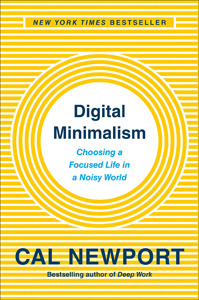 Cal Newport, Digital Minimalism: Choosing a Focused Life in a Noisy World (New York: Portfolio Penguin, 2019), 284pp.
Cal Newport, Digital Minimalism: Choosing a Focused Life in a Noisy World (New York: Portfolio Penguin, 2019), 284pp.
Cal Newport is a professor of computer science at Georgetown University, but you won't find him on Facebook, Twitter, or Instagram. He says that his smart phone "plays a relatively minor role" in his life. That's because he's leading the charge in what he calls "digital minimalism." And he invites us to join the resistance.
In the last five years or so, experts like Newport have documented the extent of our compulsive use of the internet and social media, especially on our smart phones (a key point of his book). There are all sorts of quantifications of our addictions. The average user spends about three hours a day looking at their smart phone screen. Only 12% spend less than an hour. In one study by Dscout, the average number of taps, swipes, and clicks was 2,617 per person per day. A 2015 study by Common Sense Media found that teenagers were consuming nine hours of media a day.
We also now know that none of this is an accident. Nor is it a character flaw in the user. Rather, this mass behavioral addiction, mood manipulation, and fear of missing out are all carefully engineered designs by the technology companies. Indeed, it is their very business model. We now realize that we the users are not the consumers but the product (our big data that we hand over), and that the real business of Silicon Valley is not programming apps but programming us. Forget about the naive mantra that "technology is neutral." Any number of high placed tech insiders like Sean Parker, the founding president of Facebook, have admitted this in public. See, for one more example, the book by Adam Alter, Irresistible: The Rise of Addictive Technology and the Business of Keeping us Hooked (2017).
What we need, says Newport, is not some minor life hack or readjustment. These technologies are far too powerful for such a casual response. We need nothing less than a "jarring reset" in our relationship with social media technologies. In this book he shows you how and why we all can do this, and he does so in very practical terms. His advice is based upon a study he did with 1,600 people (see his article in the April 8, 2019 NYT). Based upon what he learned in that study, Newport offers a thirty-day plan to "digitally declutter" your life. This won't be easy, he admits, but many people, each in their own way as their personal circumstances permit, are starting to relate to these technologies in much healthier ways. So, if you dare, join this "bold act of resistance" and reclaim your life.
For more on this subject, see my review of the book by Jaron Lanier, Ten Arguments for Deleting Your Social Media Accounts Right Now (New York: Henry Holt and Company, 2018), 146pp.
Dan Clendenin: dan@journeywithjesus.net


